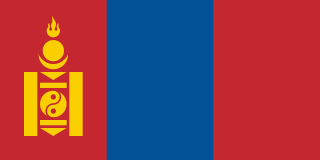 Flag of Mongolia Flag of Mongolia Twelve different parties and three separate coalitions and a record number of 498 candidates, are competing for 76 seats in the parliament or State Great Khurai. Another 2,288 candidates are vying for local council positions. Mongolia is suffering through its worst economic crisis since 2008. The economy and foreign debt repayment are two of the main issues. The electoral system has been changed since the last election in 2012 in that seats distributed through proportional representation no longer exist. This will mean that smaller parties will win less seats: "In the 2012 elections the 76 members of the State Great Khural were elected by two methods; 48 are elected from single-member constituencies and 28 from a nationwide constituency by proportional representation. However, on 5 May 2016 the electoral law was amended to remove the proportional representation seats.[2] The changes are expected to marginalise smaller parties, and also removed the right of 150,000 Mongolians expatriates to vote, as they will not be registered in a specific constituency.[2]" To win a candidate must get at least 28 percent of the vote or a by-election is held. For a vote to be valid at least 50 percent of voters in a constituency must have voted. The government or coalition winning the majority of seats gets to form the government and appoint the Prime Minister. Bolormaa, an accountant complained that there were so many candidates that it was difficult to know whom to vote for. The main focus of the Mongolian economy is mining. The low cost of commodities has hurt the sector and foreign investment is not high. Agriculture and livestock production is also a part of the economy. About 80 percent of Mongolian exports go to China. Much coal is exported to China but the demand has dropped. The two major parties in Mongolia are the Mongolian People's Party (MPP) and the Democratic Party (DP). Power shifts between the two parties but the DP has ruled for the last four years. The power base for the DP is in urban areas particularly the capital Ulaanbaatar. The opposition claims that the DP has wracked up a huge foreign debt to display expensive infrastructure projects that will be difficult for Mongolians to pay for. As MPP member Munkh_Orgil Tsend put it: "Foreign debt has become a critical issue facing our country, As I see it, our country can't pay back our foreign debt in the next few years. So most likely we have to conduct negotiations with the lenders… Current debt ratio to GDP is 55 percent and likely to reach 75 percent next year."Tsend is running as a candidate in the elections. Enkhbold Zandaahuu. the chair of the DP countered:"As of the last three years, we have built 2,720km of roads and connected seven provincial capitals with Ulaanbaatar. In 2016, we are planning to build 1,284km of roads… We laid the foundation for great development work that was not done in the last 100 years..The government will be only responsible for this and rest of the debt will be paid by private-sector companies. There is no country in the world that developed without loans." There is a huge gap between rich and poor, with one-third of Mongolians living in poverty. The MPP promises to expand welfare services, and to give cash handouts to low-income households and single mothers. The party also promises to develop coal and metallurgical industries and reduce dependence on Russia for fuel. Minor parties complain that the two large parties protect their vested interests while those of ordinary Mongolians are ignored. Gankhuyan Khassuuri, an independent candidate said: "Ninety-five percent of all bank savings are held by about 1,000 rich families. Mongolians thought and acted as if there is no other choice… I want to show that we have a third option. These two [parties] attempt to rule through their membership. However, about 20 or 30 wealthy people with offshore accounts hide behind these two parties and have been ruling the country in turn for 26 years."Social activist Tseren Enebish said that it was time to get rid of both the DP and MPP and end corruption and debt in Mongolia. Tomorrow we will see if voters listen.
0 Comments
Your comment will be posted after it is approved.
Leave a Reply. |
Like this writer's work please donate:
Ken Hanly
Ken is a retired philosophy professor living in the boondocks of Manitoba, Canada, with his Filipina wife. He enjoys reading the news and writing articles. Politically Ken is on the far left of the political spectrum on many issues.
Archives
November 2016
Categories
All
|
 RSS Feed
RSS Feed

